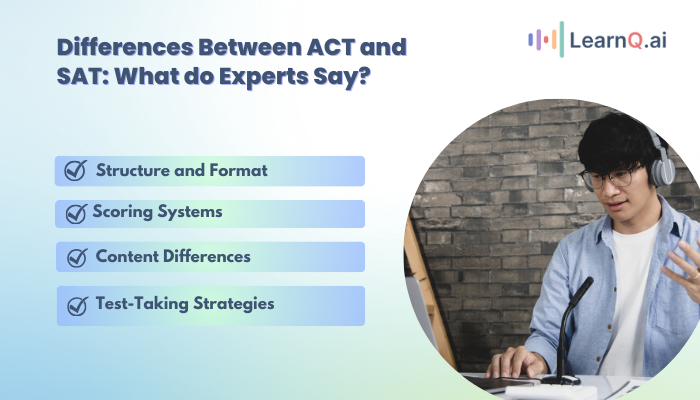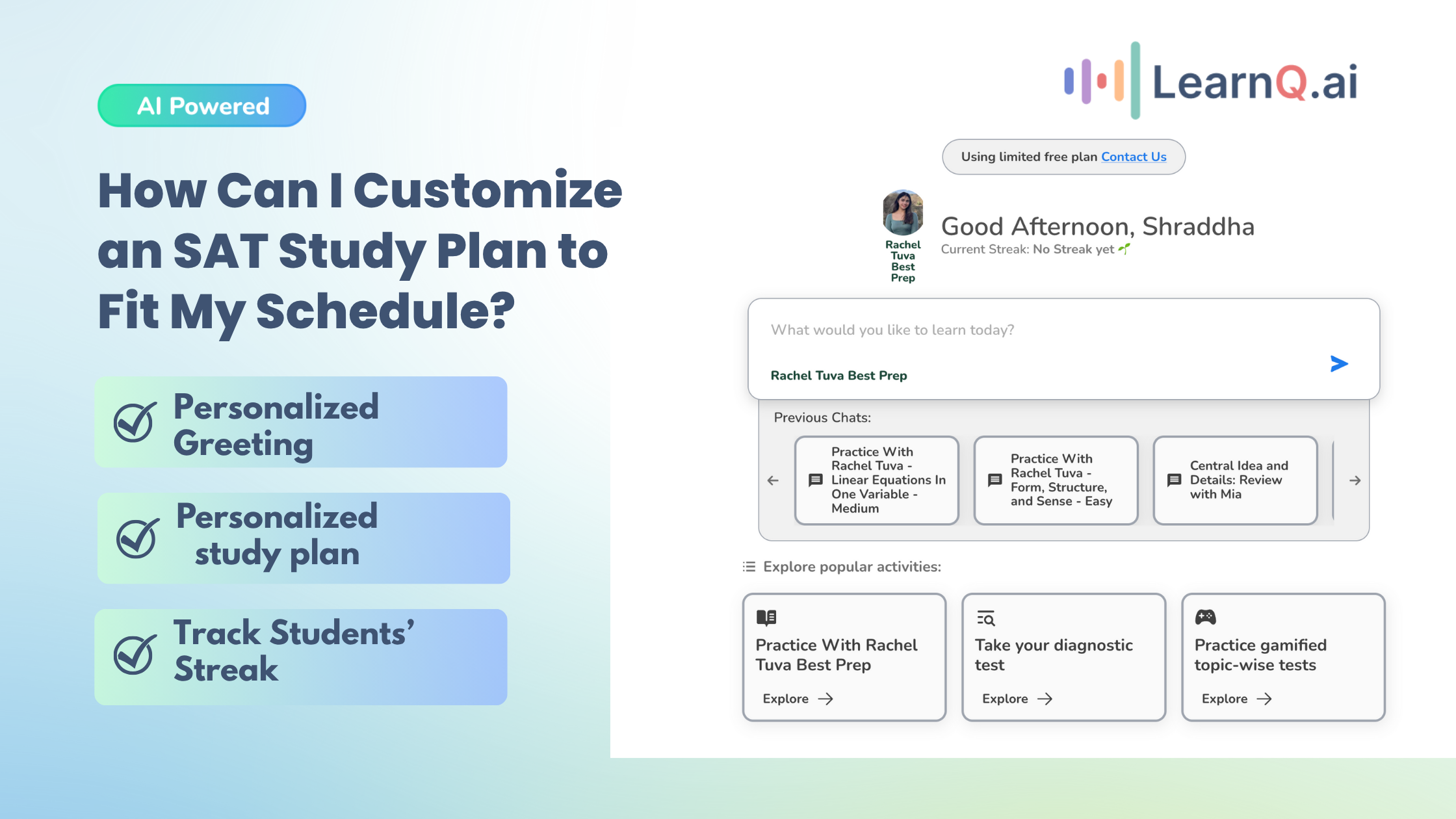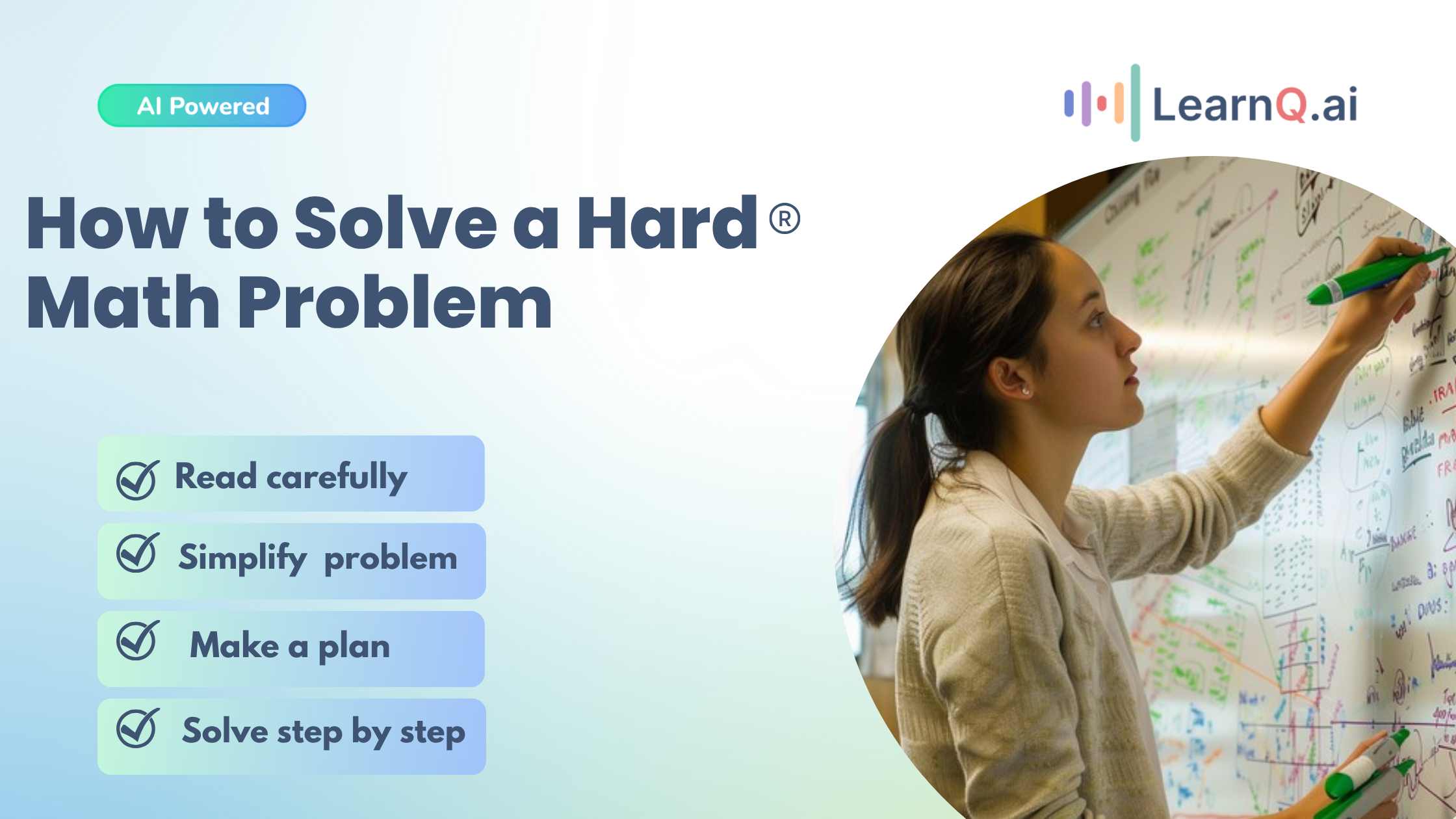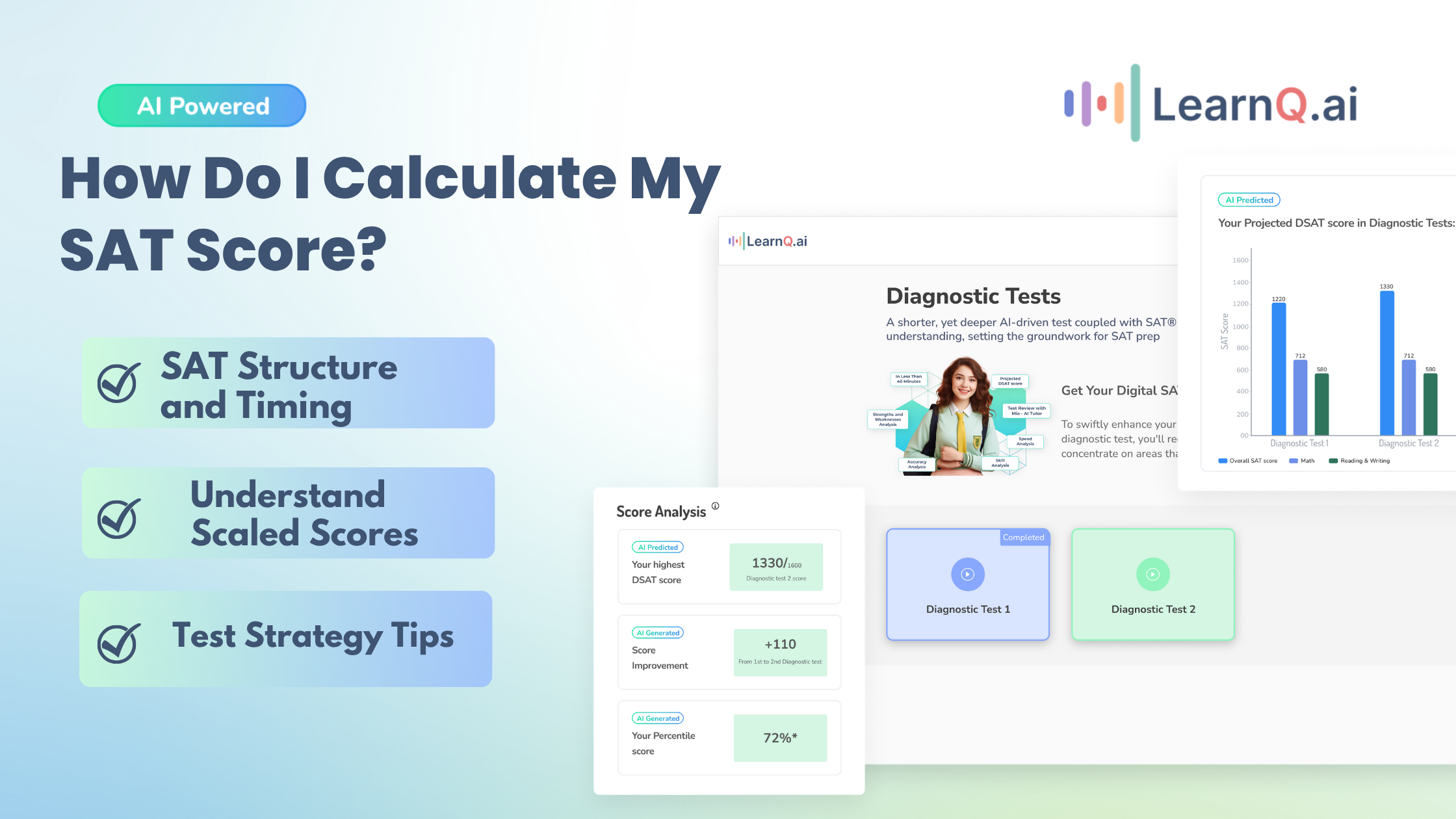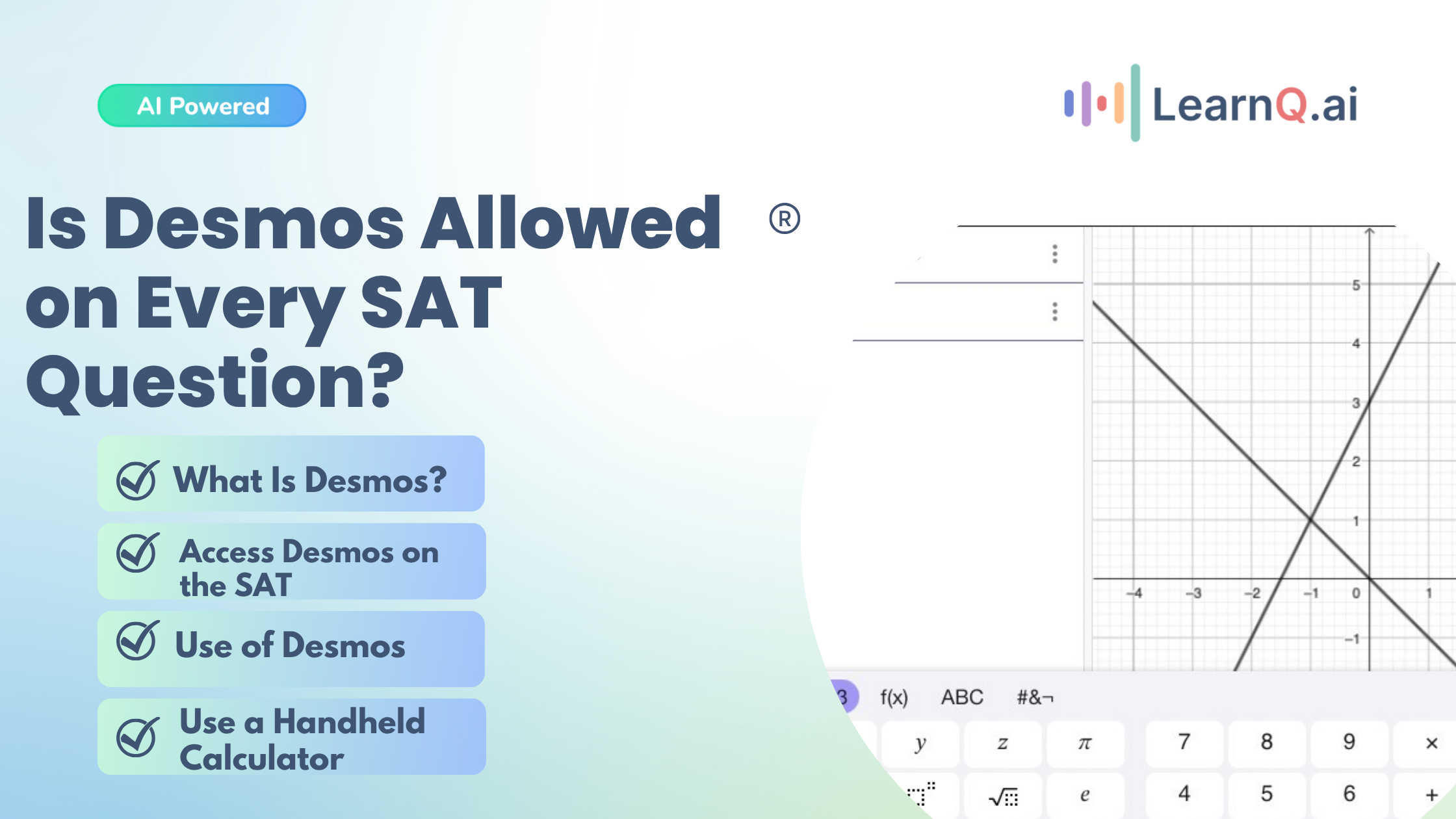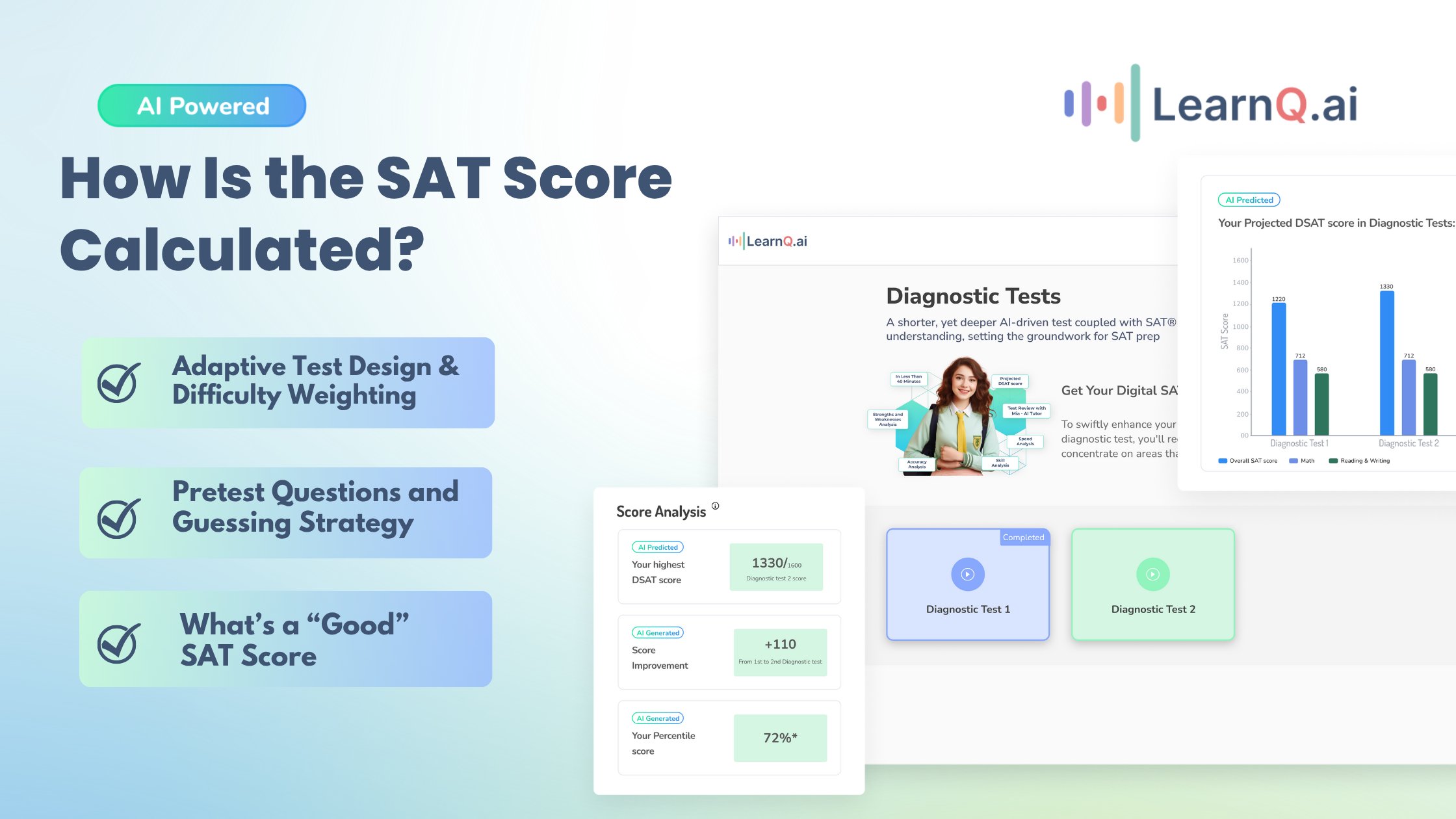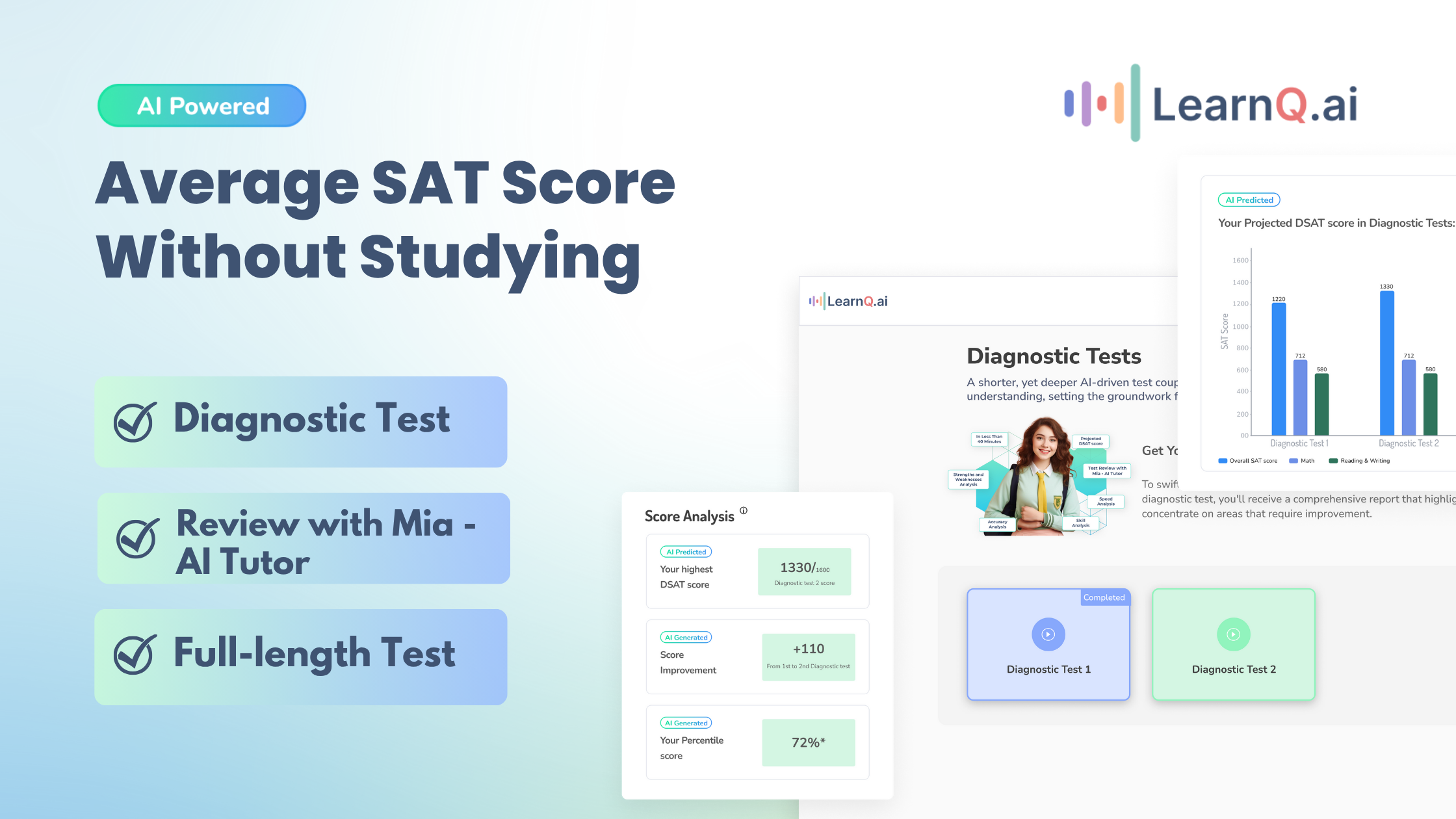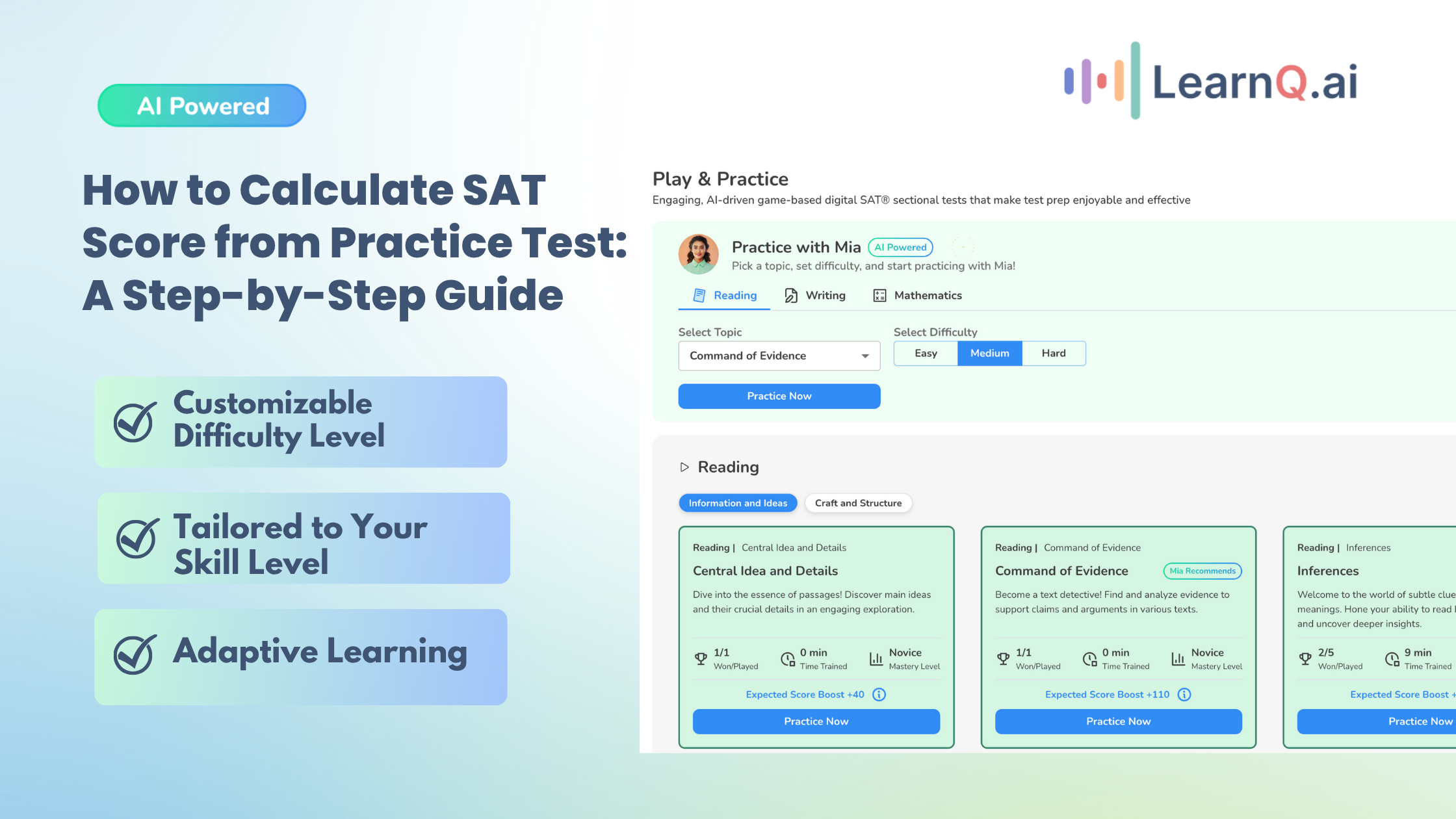When it comes to college admissions, deciding between the ACT and SAT can feel like a big decision—but understanding the differences can make your choice much easier. Both tests are widely accepted by colleges across the U.S., but each offers its own style and strengths. The key is figuring out which one plays to your strengths.
The ACT is a straightforward, curriculum-based test. It covers English, Mathematics, Reading, and Science. If you excel in science or enjoy interpreting data and charts, the ACT’s science section could work in your favor. It also tends to ask more direct questions, making it a good option if you’re comfortable with quick, clear answers and a faster-paced test.
Enhance your Digital SAT study routine with AI-driven insights and personalized practice tests.
The SAT, on the other hand, focuses more on problem-solving and critical thinking. It doesn’t include a science section but leans heavily on reading comprehension, math (with and without a calculator), and writing.
- Vocabulary and reading passages play a big role, so the SAT might suit you better if you love language arts or analyzing texts. It also allows a bit more time per question, which is great if you prefer a slower pace.
- Why does this matter for college admissions? Because colleges don’t have a preference for one test over the other, but the choice can impact how well you present your strengths.
- If math is your strong suit, the SAT’s detailed math questions could let you shine. If you’re more of a science and quick-reasoning type, the ACT’s structure might help you score higher.
According to experts, the best way to decide is by taking practice tests for both the ACT and SAT. This will give you a feel for each exam’s format, question types, and pacing. Some students naturally perform better on one than the other, and knowing your strengths early on can guide your preparation.
So, don’t stress—use these insights to pick the test that’s right for you. It’s about playing to your advantage, and once you figure out which test works best for you, you’ll be on a stronger path toward impressing college admissions.
Structure and Format Differences
Understanding the structure and format of the ACT and SAT is crucial when deciding which test to take. Each exam has a unique approach in terms of sections, timing, and scoring, which can significantly impact your test-taking experience. Knowing these details will help you align your study plan and strategy to your strengths.
A. Test Sections
The ACT and SAT test similar skills, but their sections differ slightly, especially in focus and content:
- ACT Sections:
- English: Focuses on grammar, punctuation, sentence structure, and rhetoric.
- Math: Covers algebra, geometry, trigonometry, and reasoning skills.
- Reading: Tests reading comprehension with literature, social studies, and natural sciences passages.
- Science: This section is unique to the ACT and evaluates your ability to interpret scientific data, graphs, and experiments.
- Optional Essay: This 40-minute essay assesses your ability to build and support an argument, but it’s optional for many schools.
- SAT Sections:
- Reading: Tests reading comprehension through passages from literature, history, social sciences, and science.
- Writing & Language: Focuses on grammar, usage, and sentence structure.
- Math: Divided into two parts—one allows a calculator, and the other doesn’t. It covers algebra, data analysis, and some advanced math concepts.
- Optional Essay: The SAT no longer includes an essay section (discontinued after 2021).
Enhance your Digital SAT study routine with AI-driven insights and personalized practice tests.
While both tests cover math and reading, the ACT includes a science section, making it a better fit if you enjoy interpreting charts and scientific concepts. On the SAT, math without a calculator can be tricky for some students, but online platforms like LearnQ offer excellent resources for building math skills and test prep, helping you feel confident across all SAT sections.
Also Read: Comparing Difficulty: Real SAT vs Practice Tests
B. Timing and Pacing
Timing plays a big role in choosing between the ACT and SAT. The pace of each test can either boost your score or become a challenge, depending on your test-taking style.
- ACT: Known for being faster-paced, the ACT requires you to answer more questions in less time. For example, you’ll have only 35 minutes to tackle 40 Reading questions, which pushes you to move quickly.
- SAT: The SAT offers more time per question, allowing you to slow down and think critically. In the Math section, you’ll get a total of 80 minutes for 58 questions, giving you more time for problem-solving. This slower pace makes it ideal for students who prefer to work carefully through questions without feeling rushed.
If you find that you need extra time to absorb concepts or work through complex problems, the SAT’s pacing might suit you better. Platforms like LearnQ provide personalized SAT practice that adjusts to your learning speed, helping you improve time management and build confidence.
C. Scoring Systems
Both tests have different scoring systems, which can influence how you perceive your overall performance:
- ACT: The ACT assigns a composite score out of 36. Each section (English, Math, Reading, Science) is scored individually on a 1-36 scale, and the average of these four scores forms your composite. If you take the essay, it’s scored separately and doesn’t affect your composite score.
- SAT: The SAT uses a total score out of 1600, combining your scores from the Math and Evidence-Based Reading & Writing sections. Each is scored on a 200-800 scale, and your final score is the sum of these two numbers.
The SAT’s 1600-point scale could be more flexible if a broader scoring range appeals to you. On the other hand, the ACT’s 36-point scale offers a more simplified measure of your performance.
No matter which test you choose, using targeted resources like LearnQ’s SAT prep tools can help you boost your score through personalized practice, mock tests, and performance tracking.
Ultimately, deciding between the ACT and SAT comes down to understanding these structure and format differences. Whether you prefer a faster-paced test or one that allows more time for problem-solving, LearnQ can help you navigate the SAT effectively with its smart learning features and adaptive practice tests.
Read More: What is the Highest Score on ACT and SAT Tests?
LearnQ.ai is Powered by VEGA AI—Is your Institute Next?
Give students a Duolingo-style test-prep platform with Shopify-level customization for tutors and institutes.
Content Differences
When comparing the ACT and SAT, it’s essential to understand how each test covers content areas like math, science, reading, and English. These content differences can impact your test-taking experience and ultimately influence which test aligns better with your strengths.
A. Math Section
The math sections on the SAT and ACT differ in the types of questions they ask and the emphasis they place on various math concepts.
- SAT Math:
- Emphasis on Algebra: The SAT focuses heavily on algebra, particularly linear equations, problem-solving, and data analysis.
- Grid-In Questions: In addition to multiple-choice questions, the SAT includes grid-in questions, where you need to calculate and write your own answers.
- Calculator/Non-Calculator Portions: The SAT divides its math section into two parts—one where you can use a calculator and one where you cannot. This tests your mental math abilities along with your problem-solving skills.
- ACT Math:
- Broader Math Coverage: The ACT covers more geometry and trigonometry compared to the SAT, and also includes more straightforward arithmetic and algebra questions.
- Calculator Allowed Throughout: One of the ACT’s advantages is that you can use a calculator for the entire math section, which might be a relief if you’re not confident in performing mental calculations under pressure.
Platforms like LearnQ can be incredibly useful for SAT prep. They provide personalized math practice that adapts to your strengths and areas needing improvement, particularly when dealing with the SAT’s more algebra-focused problems.
B. Science Section
The way the ACT and SAT approach science is another key difference.
- ACT Science:
- Dedicated Science Section: The ACT includes a specific science section, which tests your ability to interpret data, analyze scientific experiments, and understand graphs. It doesn’t test specific science facts but focuses on your reasoning skills within scientific contexts.
- SAT Science:
- Integrated Science Content: The SAT does not have a separate science section. However, it includes scientific data and graphs within its Reading, Writing, and Math sections, asking you to interpret and analyze these in context. While it’s not as concentrated as the ACT’s science section, the SAT still evaluates your ability to work with scientific information.
If interpreting data and scientific reasoning come naturally to you, the ACT’s dedicated science section could benefit you.
C. Reading and English
Both the ACT and SAT include reading and English sections, but they test different skills and require different approaches.
- ACT Reading and English:
- Focus on Quick Comprehension: The ACT Reading section asks you to answer questions quickly based on specific details in the text. The English section emphasizes grammar, punctuation, and sentence structure, testing your ability to quickly correct errors and improve text clarity.
- SAT Reading and Writing:
- Emphasis on Vocabulary and Evidence-Based Reading: The SAT places more importance on vocabulary in context and understanding how words are used to convey meaning in passages. It also requires you to find evidence within the text to support your answers, pushing you to engage more deeply with the material.
- Command of English Language: The SAT’s Writing & Language section tests your ability to analyze passages for grammatical correctness, flow, and effectiveness in communication.
Also Read: Tips for Solving Problems on SAT Practice Test With Study Plan
Test-Taking Strategies
Choosing the right test often depends on how well your skills align with each test’s unique demands. Both the ACT and SAT require specific strategies to succeed, from time management to effective use of a calculator. The following table highlights key test-taking strategies for both exams.
| Strategy | ACT | SAT |
| A. Skills Needed for Success | – Speed and quick critical thinking.- Ability to answer many questions in a short time.- Strong time management across all sections. | – Deep reasoning and critical thinking.- Strong problem-solving skills for multi-step questions.- Endurance to handle fewer but longer and more complex questions. |
| B. Guessing Strategies | – Guess freely: No penalty for wrong answers.- Focus on eliminating obviously incorrect choices to increase guessing odds. | – Guess freely: No penalty for wrong answers.- Process of elimination helps narrow down choices, especially in reading and math. |
| C. Calculator Use | – Allowed throughout the math section, providing flexibility in calculations. | – Calculator limited to one section: Be prepared to handle non-calculator problems in the Math (No Calculator) section. |
Also Read: Common Hardest SAT Math Questions Everyone Misses
College Admissions Perspectives
When it comes to college admissions, understanding how schools view the ACT and SAT can help you optimize your test strategy.
| Aspect | Details |
| A. Acceptance and Preference | – Most colleges accept both tests equally, so you can choose based on your strengths.- Some schools might have a slight preference, so it’s worth researching individual college policies. |
| B. Superscoring | – Superscoring allows colleges to combine your best section scores from different test dates.- ACT: Many schools offer superscoring.- SAT: Superscoring is widely available and used by most colleges. |
Which Test Should You Choose? Expert Opinions
Selecting between the ACT and SAT comes down to your personal strengths and test-taking style. Experts recommend aligning your choice with the following characteristics.
A. Who Should Take the ACT?
- Best for students who:
- Excel in science reasoning.
- Prefer a fast-paced testing environment with a shorter time per question.
- Are comfortable with geometry and trigonometry questions.
B. Who Should Take the SAT?
- Ideal for students who:
- Enjoy deeper problem-solving and multi-step questions.
- Are strong in algebra and data analysis.
- Prefer having more time per question to carefully work through answers.
C. Importance of Practice Tests
- Experts emphasize taking practice tests for both the ACT and SAT to help you determine which exam feels more natural for you. Mock tests can reveal your strengths and guide your study strategy.
LearnQ.ai is powered by VEGA AI—Is your institute next?
Offer students a Duolingo-style test-prep platform with Shopify-level customization for tutors and institutes.






Conclusion
Choosing between the ACT and SAT is a big decision in your college admissions path. Understanding each test’s structure, content, and strategies can help you pick the one that aligns best with your strengths. With the right preparation, you’ll be set to shine on test day!
To reach your full potential, make practice tests and focused study sessions part of your routine. Target your weak areas and sharpen your skills with purpose. Get started with LearnQ.ai—an interactive platform that offers a realistic test environment and detailed analytics to track your progress and boost your confidence.
Want extra support? Join other SAT students on Discord through LearnQ’s community. Here, you can swap tips, ask questions, and keep each other motivated. With LearnQ.ai’s free diagnostic tests and community support, you’ll have everything you need to make the right choice and excel.

